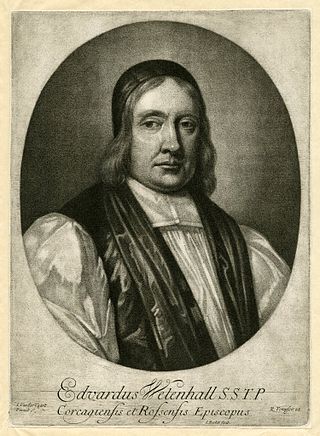Related Research Articles

Harthacnut, traditionally Hardicanute, sometimes referred to as Canute III, was King of Denmark from 1035 to 1042 and King of the English from 1040 to 1042.

John Dryden was an English poet, literary critic, translator, and playwright who in 1668 was appointed England's first Poet Laureate.
This article contains information about the literary events and publications of 1693.

George Chapman was an English dramatist, translator and poet. He was a classical scholar whose work shows the influence of Stoicism. William Minto speculated that Chapman is the unnamed Rival Poet of Shakespeare's sonnets. Chapman is seen as an anticipator of the metaphysical poets of the 17th century. He is best remembered for his translations of Homer's Iliad and Odyssey, and the Homeric Batrachomyomachia.

Earl of Chichester is a title that has been created three times, twice in the Peerage of England and once in the Peerage of the United Kingdom. The current title was created in the Peerage of the United Kingdom in 1801 for Thomas Pelham, 2nd Baron Pelham of Stanmer.

Sir Richard Blackmore, English poet and physician, is remembered primarily as the object of satire and as an epic poet, but he was also a respected medical doctor and theologian.

Thomas Creech was an English translator of classical works, and headmaster of Sherborne School. Creech translated Lucretius into verse in 1682, for which he received a Fellowship at Oxford. He also produced English versions of Manilius, Horace, Theocritus, and other classics.
The Dialogue on Translation between a Lord and a Clerk, or Dialogus inter dominum et clericum, was written by John Trevisa. Along with the dedicatory Epistle, it forms the introduction to his 1387 translation of the Polychronicon of Ranulf Higden, commissioned by Trevisa's patron, Lord Berkeley. Written in Middle English, it consists of a series of arguments made by the clerk on why books should not be translated from learned languages such as Latin, each one followed by a rebuttal from the lord. The clerk eventually agrees, and the exchange concludes with a prayer for guidance in the translation.
Trivia is information and data that are considered to be of little value.

Robert Gould was a significant voice in Restoration poetry in England.

Decimus Junius Juvenalis, known in English as Juvenal, was a Roman poet active in the late first and early second century AD. He is the author of the collection of satirical poems known as the Satires. The details of Juvenal's life are unclear, although references within his text to known persons of the late first and early second centuries AD fix his earliest date of composition. One recent scholar argues that his first book was published in 100 or 101. A reference to a political figure dates his fifth and final surviving book to sometime after 127.
Bellamira: or, The Mistress is a comedy by Sir Charles Sedley, published in 1687, partly modelled on Terence's Eunuchus.
Nationality words link to articles with information on the nation's poetry or literature.

Sir Thomas Pope Blount, 1st Baronet was an English politician and baronet.
Quis custodiet ipsos custodes? is a Latin phrase found in the Satires, a work of the 1st–2nd century Roman poet Juvenal. It may be translated as "Who will guard the guards themselves?" or "Who will watch the watchmen?".
Sir Robert Stapylton or Stapleton was an English courtier, dramatic poet and translator.

Edward Wetenhall (1636–1713) was an English bishop of the Church of Ireland. His name is also spelled Wettenhall, Whetenhall, Whitnall, Withnoll, and Wythnall.
Higden is a town in Arkansas.
Samuel Grascome (1641–1708) was a clergyman of the Church of England, then, after the nonjuring schism, a member of the breakaway church.

What is Vegetarianism? is a 1886 pamphlet written by John E. B. Mayor on vegetarianism.
References
. Dictionary of National Biography . London: Smith, Elder & Co. 1885–1900.